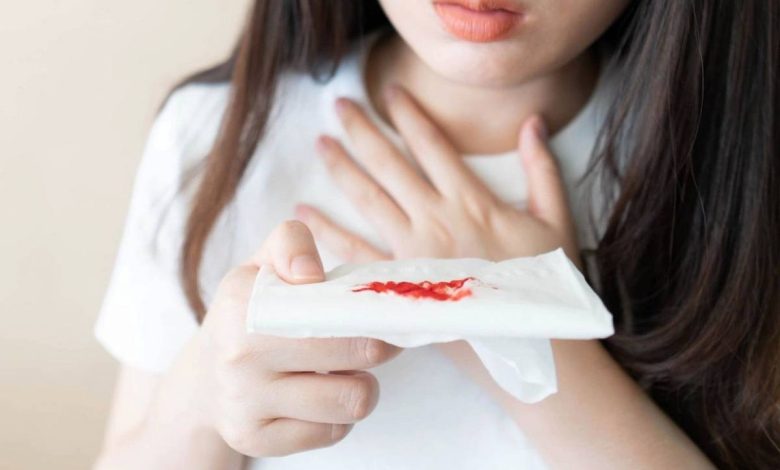Coughing up blood, hemoptysis: what is this, causes, symptoms, diagnostics, treatment, prevention

Coughing up blood; Hemoptysis; Spitting up blood; Bloody sputum
Coughing up blood, also known as hemoptysis, represents a state, in which a person coughs up blood-stained mucus or sputum from the lungs. This could be a serious symptom., indicating major health problems, therefore it is necessary to seek medical attention as soon as possible.
Causes of coughing up blood
There are several major health conditions, which can cause bleeding, including:
- Pulmonary infections, such as pneumonia, bronchitis or tuberculosis
- Chronic obstructive pulmonary disease (COPD)
- Pulmonary embolism
- Pulmonary hypertension
- Lung cancer
- Bronchiectasis
- Sarkoidoz
- Interstitial lung disease
- Vasculitis
Symptoms of coughing up blood
Beyond coughing up blood, other symptoms, which may be associated with hemoptysis, include:
- Chest pain
- Breathlessness
- Fatigue
- Expectoration of large amounts of sputum
- Crepitation
- Rapid breathing
- Loss of appetite
- Fast heart rate
When to contact a healthcare professional
If you cough up blood, as soon as possible to seek medical help. You should also seek medical attention, if you are experiencing any other symptoms, such as chest pain, shortness of breath or palpitations.
Diagnosis of coughing up blood
Diagnosis of hemoptysis usually includes a physical examination, taking a medical history and a series of tests. These tests may include:
- Chest X-ray
- CT scan
- Bronchoscopy
- Blood tests
- Pulmonary function tests
Treatment for coughing up blood
Treatment for hemoptysis depends on the underlying cause. For Example, if it is caused by an infection, They can be treated with antibiotics. If it's caused by lung cancer, may require surgery or radiation therapy. Other treatments for hemoptysis may include:
- Kislorodnaya therapy
- Bronchodilators
- Anti-inflammatory drugs
- Blood thinners
- Chemotherapy
- Radiation therapy
Home treatment for coughing up blood
In addition to medication, there are several home remedies., that can help manage hemoptysis. These include:
- Drink plenty of fluids, to keep the mucus liquid
- Avoid irritants, which can cause coughing, such as smoke, dust and strong odors.
- Using a humidifier to humidify the air
- Rest and avoidance of physical activity, which can strain the lungs.
Prevention of coughing up blood
There are several preventive measures, which may help reduce the risk of hemoptysis, including:
- Smoking cessation
- Avoid exposure to lung irritants
- Vaccination against infections, like influenza and pneumonia
- Management of major health conditions, such as COPD and hypertension
- Maintaining good hygiene to prevent the spread of infections
Coughing up blood can be a serious symptom., indicating major health problems. It is extremely important to seek medical help as soon as possible and follow the treatment plan prescribed by the doctor.. Besides, there are several home remedies and preventive measures, which can help manage hemoptysis and reduce its risk. Remember, that prompt and appropriate treatment is the key to ensuring a positive outcome for people, suffering from hemoptysis.
It is also important to lead a healthy lifestyle., eating a balanced diet, exercising regularly and avoiding bad habits, such as smoking and excessive drinking. Regular checkups with your doctor can also help catch any underlying health problems early., which may lead to more effective treatment and management.
In conclusion, coughing up blood is not a condition, which should be taken lightly. If you or someone you know is experiencing hemoptysis, it is important to seek medical attention as soon as possible. With proper diagnosis and treatment, people can manage the condition and reduce their risk of developing it..
Used sources and literature
Brown CA. Hemoptysis. In: Walls RM, Hockberger RS, Gausche-Hill M, eds. Rosen’s Emergency Medicine: Concepts and Clinical Practice. 9th ed. Philadelphia, PA: Elsevier; 2018:chap 21.
Swartz MH. The chest. In: Swartz MH, ed. Textbook of Physical Diagnosis: History and Examination. 8th ed. Philadelphia, PA: Elsevier; 2021:chap 13.
